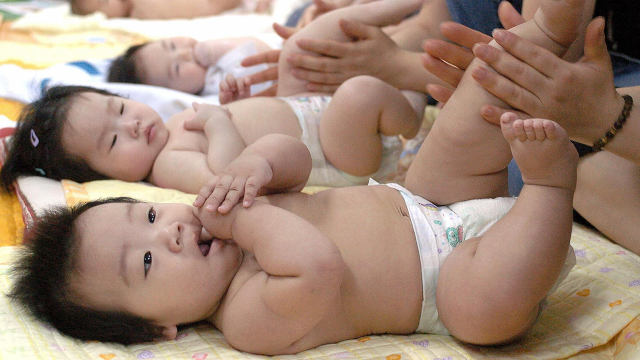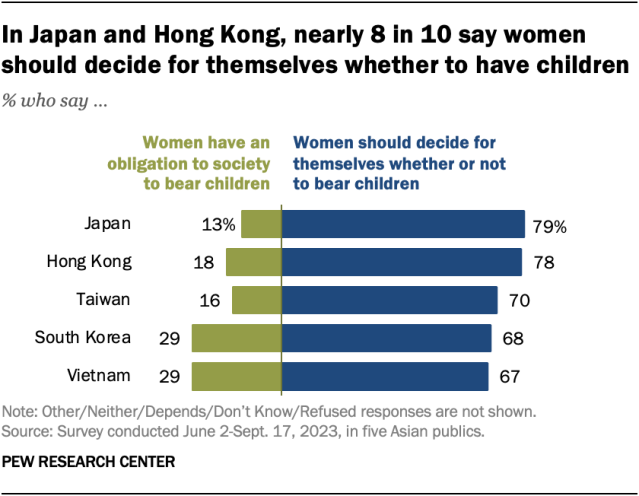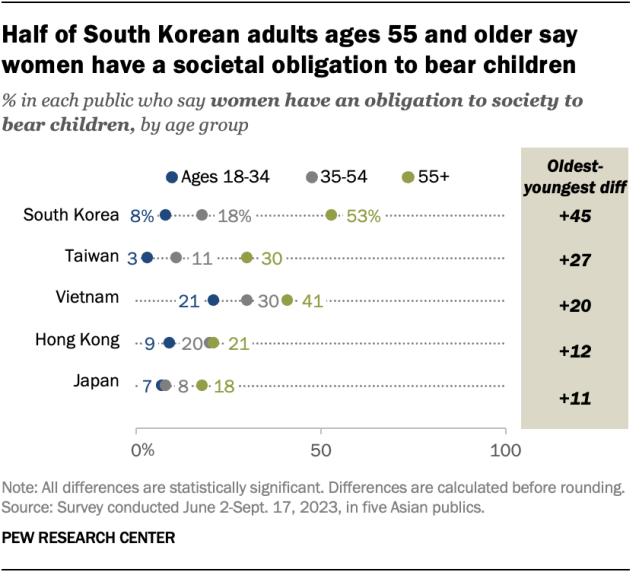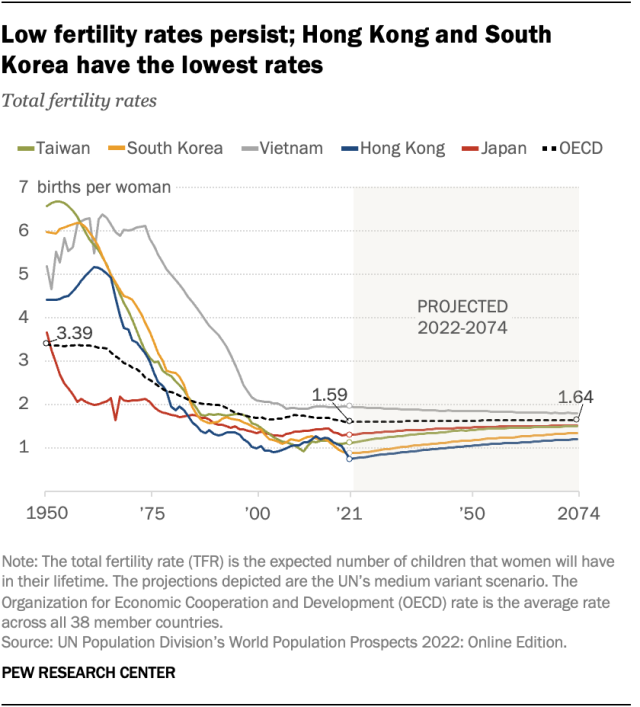
For years, South Korea has had one of the world’s lowest fertility rates. It dropped to an all-time low in 2023, despite the hundreds of billions of dollars its government has spent on policies to boost fertility in the past two decades. Fertility rates are also at or near record lows in other parts of the broader region.
Amid these national challenges, fewer than a third of adults in South Korea and four neighboring places say women have an obligation to society to have children, according to a Pew Research Center survey conducted June 2-Sept. 17, 2023. Majorities instead say women should decide for themselves whether to bear children.
The data used in this analysis is part of a larger Pew Research Center project examining religion, spirituality and nonreligion in Hong Kong, Japan, South Korea, Taiwan and Vietnam.
Typically, East Asia is considered to encompass China, Hong Kong, Japan, Macau, Mongolia, North Korea, South Korea and Taiwan. In geopolitical terms, Vietnam is often categorized as Southeast Asian. But we include Vietnam in this analysis for several reasons, including its close historic ties to China and its role in the broader East Asian “Confucian cultural sphere.” Moreover, Buddhists in Vietnam practice the same strain of Buddhism (Mahayana) found throughout East Asia today.
Several places that are generally considered part of East Asia were not surveyed due to legal and logistical challenges. Currently, China does not allow non-Chinese organizations to conduct surveys on the mainland, and public opinion surveys are not possible in North Korea. We did not attempt to survey in Macau because of the small size of its population. Conducting nationally representative surveys in Mongolia is difficult due to the nomadic lifestyle of a large part of its population.
Pew Research Center conducted this analysis to assess how adults think about childbearing in East Asia and neighboring Vietnam.
The data comes from a survey of 10,390 adults (ages 18 and older) in five places: Hong Kong, Japan, South Korea, Taiwan and Vietnam. In the first four places, interviews were conducted via computer-assisted telephone interviewing (CATI). In Vietnam, interviews were administered face-to-face using tablet devices, also known as computer-assisted personal interviewing (CAPI). All surveys were conducted between June 2 and Sept. 17, 2023.
This survey is part of the Pew-Templeton Global Religious Futures project, which analyzes religious change and its impact on societies around the world.
Respondents were selected using probability-based sample designs. The data was weighted to account for different probabilities of selection among respondents and to align with demographic benchmarks for adult populations.
Here are the questions used for the analysis, along with responses, and the survey methodology.
Public opinion about bearing children

In Hong Kong, Japan, South Korea, Taiwan and Vietnam, about three-in-ten or fewer adults say women have an obligation to society to bear children. South Korea and Vietnam have the highest shares of adults who say this (29% each), while Japan (13%) and Taiwan (16%) have the lowest.
Instead, two-thirds or more in all places surveyed say that women should decide for themselves whether to bear children.
Demographic differences

Across all places surveyed, older adults are more likely than younger adults to say women have a societal obligation to bear children.
For example, in South Korea, about half of adults ages 55 and older say women have this obligation, while roughly a fifth of adults ages 35 to 54 say this. An even smaller share of South Korea’s youngest adults (8%) hold this view.
In general, men are somewhat more likely than women to say women have a duty to bear children. The largest gender gap is in South Korea, where 34% of men and 23% of women say this.
Across all places surveyed, adults with lower levels of education are more likely than those with higher levels of education to say women have a societal obligation to have children. Those who are or have been married are also more likely than those who have never been married to say this.
In South Korea, Buddhists, Christians and those who say they are not affiliated with any religion also vary on this question. About four-in-ten Korean Buddhists (43%) say women have an obligation to have children, compared with 33% of Christians and 22% of people who are religiously unaffiliated.
Additionally, in Japan, South Korea and Taiwan, adults who pray daily are somewhat more likely than those who pray less often to say women are obligated to have children.
Fertility rates in the surveyed places

Low fertility rates have been widespread across these places since at least the turn of the 21st century. As of 2021, Hong Kong (0.75), South Korea (0.88), Taiwan (1.11) and Japan (1.30) had fertility rates below the average rate among members of the Organization for Economic Cooperation and Development, a group of mostly highly developed, democratic countries (1.59). That is expected to continue for at least the next 50 years.
These fertility rates are also well below the global replacement rate of 2.10 births per woman, and they’re expected to remain that way over the next 50 years.
What is the replacement rate?
The replacement rate is the total fertility rate required to maintain a population at a constant size. Globally, this is estimated to be 2.10 births per woman.
While Japan has had fertility rates around or below the replacement rate since the 1950s, other places in this analysis have dropped below this rate more recently. For example, Vietnam’s fertility rate dropped below 2.10 for the first time around 2000. These low rates can lead to smaller and aging populations (as seen in Japan) and can have negative effects on labor force participation and a country’s economy.
Concerns about these low rates have led to government policies such as giving parents a cash allowance to help cover the cost of raising a child. For instance, for more than 50 years, Japan has been giving many families monthly cash stipends. Parents in South Korea and Taiwan also currently receive a monthly stipend for each young child, whereas parents in Hong Kong receive a one-time payment when a baby is born. Women in some Vietnamese districts and cities receive cash or gifts if they have two children before the age of 35.
Other government policies have focused on increasing the amount of paid parental leave, helping pay for child care, or promoting a fairer distribution of household responsibilities for couples.
Related: East Asians’ views on sharing financial and caregiving duties in the home
Local governments in South Korea and Taiwan have even offered government-sponsored matchmaking events to help single adults find a partner, since married couples tend to have more children than unmarried adults in the region.
Government views of whether citizens are obligated to have children are varied in East Asia. Japan’s government has emphasized childbearing is something fun for couples and should not be viewed as a duty. In contrast, neighboring country China recently promoted “a marriage and childbearing culture,” as Chinese President Xi Jinping called for women to establish a “new trend of family” to address the country’s aging population and low fertility rates. In 2023, North Korean leader Kim Jong Un explicitly told women it is their duty to have children.
Note: Here are the questions used for the analysis, along with responses, and the survey methodology.